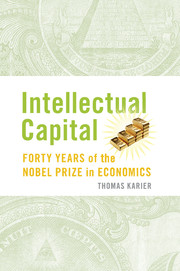Book contents
- Frontmatter
- Contents
- Preface
- Economic Nobel Laureates
- 1 An Economic Prize
- 2 Free-Market Economics
- 3 Micro: The Chicago School
- 4 Stock Market Casino
- 5 More Micro
- 6 Behaviorists
- 7 Keynesians
- 8 Classical Revival
- 9 Inventors
- 10 Game Geeks
- 11 General Equilibrium
- 12 A World View
- 13 Numbers Guys
- 14 History and Institutions
- 15 Reshaping the Prize
- Notes
- Index
- Frontmatter
- Contents
- Preface
- Economic Nobel Laureates
- 1 An Economic Prize
- 2 Free-Market Economics
- 3 Micro: The Chicago School
- 4 Stock Market Casino
- 5 More Micro
- 6 Behaviorists
- 7 Keynesians
- 8 Classical Revival
- 9 Inventors
- 10 Game Geeks
- 11 General Equilibrium
- 12 A World View
- 13 Numbers Guys
- 14 History and Institutions
- 15 Reshaping the Prize
- Notes
- Index
Summary
Understanding the benefits from international trade has been an important objective of economists for centuries. As each new economic theory was developed, some economists soon applied it to questions about trade. For example, Sir John Hicks had only recently developed general equilibrium models when Bertil Ohlin added an international sector to them to explain why countries specialize in certain exports. And when Keynesian models were still relatively new in the 1950s, James Meade added an international sector to see how it affected macroeconomic policy. His student, Robert Mundell, continued to explore this question in the 1960s. Then, in the late 1970s, Paul Krugman introduced familiar models of monopolistic competition and economies of scale into trade models and created something of a hybrid. Each of these economists was a Nobel Prize winner who helped to draw attention to the importance of international issues.
Economists Sir W. Arthur Lewis and Amartya K. Sen were more interested in the problems of underdevelopment that led to widespread poverty, hunger, and occasionally famine. Many economists either ignored less-developed countries or simply assumed that they operated under the same principles as developed countries. Nobel Prize winners Lewis and Sen were not willing to ignore the plight of these countries. They wanted to understand the problems that made these countries different, problems that they had personally experienced; Lewis was from St. Lucia and Sen from India.
Amartya K. Sen (1998 Prize Winner)
Amartya Sen did not exactly fit the profile for a Nobel Prize winner in economics.
- Type
- Chapter
- Information
- Intellectual CapitalForty Years of the Nobel Prize in Economics, pp. 236 - 259Publisher: Cambridge University PressPrint publication year: 2010

